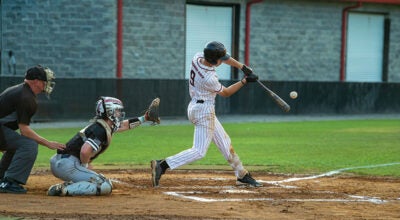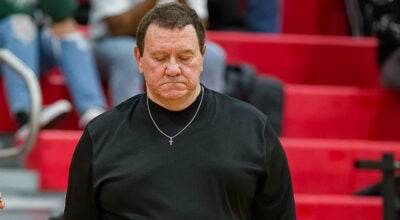The Mayfield way
Published 8:02 pm Saturday, April 23, 2016

Spencer Mayfield Jr. trained his players to be more than just basketball players but capable, successful men on and off the court. Mayfield stands in the back row on the far right next to the Nansemond River High School boys’ basketball team that he led to the 1995 state championship. (Submitted Photo)
Few have left an impact within the city of Suffolk as profound as Spencer Mayfield Jr.
Born, raised and still a resident in Suffolk, he was the renowned boys’ basketball coach at John F. Kennedy High School in the 1970s and ‘80s and then Nansemond River High School for half of the 1990s.
Mayfield noted that in the basketball world, both schools were the most hated in Tidewater, and he offered up the two-fold reason why that was so — he coached them, and they were remarkably successful.
“My kids played a certain way, and they could only play a certain way,” he said. “The Mayfield way — hard, tough and you took no back step. You gave your best at all times.”
From his players, “I demanded a hundred percent,” he said. “In the classroom, in the school, in the hallway, on the floor — they were the best.”
He listed his win-loss record through 25 years of coaching at John F. Kennedy and Nansemond River as 411-170.
Mayfield led John F. Kennedy to a state championship in 1974 with a record of 25-0, and he drove it to another title in 1983 when it went 28-0.
After switching over to Nansemond River, he coached the Warriors to state championship wins in 1992 and 1995, with records of 27-1 and 26-2, respectively.
Mayfield noted that his strict way of doing things angered some people, but he believed there was one way to coach the game, and it required a hundred percent effort from all involved.
“I was that kind of a person as a player in high school and in college,” he said.
He played for Booker T. Washington High School in Suffolk, and then went on to be a four-year starting point guard at Elizabeth City State University.
Having a successful playing career at the college level is hard enough for most people, but Mayfield did it with only eight fingers.
“That’s where I got the toughness from,” he said.
He lost the index and middle fingers on his left hand as a high school student in an accident with a saw during shop class.
But the incident did not scare him off from shop, as he noted he “finished high school, went to college and majored in the same thing.”
He earned a degree in industrial arts and taught shop for 35 years at John F. Kennedy and Nansemond River.
Mayfield said what he loved most about coaching high school basketball was dealing with the young people, adding that it was “the greatest job that any person could get, to see them change before you, and come in raw, don’t know anything, can’t do anything. You transform them into a blossom. And most of my kids were from the other side of the fence, if you know what I mean.”
“I told them, ‘Give them to me. I’ll take them,’” he continued. “They gave them to me, and when they got them back, they got a man back. I mean, a man. That was my thing.”
Regardless of what side of the fence his players started on, the Mayfield way got results.
Players from his teams fill leadership positions all over the city and Hampton Roads. Lakeland High School activities director Gregory Rountree played for him at John F. Kennedy, as did Franklin Chatman, who is head coach of the men’s basketball team at The Apprentice School.
His former Nansemond River players include Apprentice School women’s basketball head coach Keith Stagg, Lady Builders’ assistant coach Leroy Skinner, Builders assistant coach Derrick Bryant and King’s Fork High School girls’ basketball coach Maurice Fofana.
“He was hard, but he was fair,” Fofana said of Mayfield. “And along with me and so many other guys, we just learned so much stuff from him.”
Bryant noted that Mayfield was a great motivator.
“He took a bunch of guys that just wanted to play basketball and motivated them to succeed in whatever they did, whether it was in the classroom or whether it was on the floor,” Bryant said.
The personal connection he was able to make with his student-athletes was key.
“He cared about you as a person,” Rountree said. “When you know somebody cares about you, you’re going to continue to fight for that person.”
Mayfield created a familial bond, even down to how he referred to his players.
“He called all of us ‘son,’” Rountree said.
Bryant said, “He used basketball as his tool to guide us and make us the men that we would need to become for later in life, and for that I’m forever grateful for him.”






